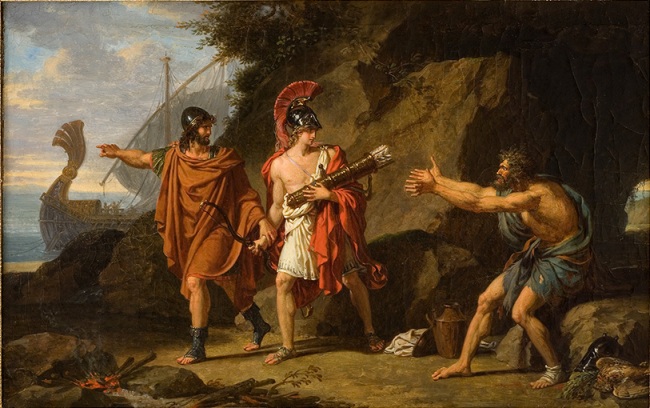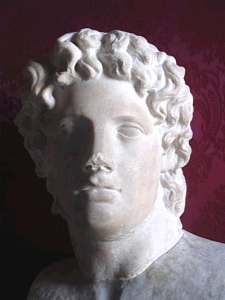By Ben Potter and Anya Leonard
Sophocles’ Philoctetes, first performed in 409 BC, isn’t a typical tragedy, certainly not in the more modern perception of the genre. There is no high death toll and no evil, underhand conniving that leaves characters bitter and crushed. In a word, there is no blood. In fact, as far as Greek tragedy goes, Philoctetes is really a ‘happy ever after tale’ with all the characters basically getting off the island of Lemnos with a good deal. But then how does Sophocles keep it interesting? Through the tension and conflict that is a precursor to the successful conclusion that the audience knows is to come. So whilst Philoctetes may disappoint with its lack of fatalities, it is certainly abundant in suspense.
But let’s rewind a little bit and set the scene. Philoctetes takes place on the island of Lemnos and is a prelude to the triumphant Greek conclusion of the Trojan War. In order to succeed in said campaign, the Greeks need a specific weapon, which was once owned by Heracles and currently in possession of the lame and tormented castaway Philoctetes, who received the gift for lighting the demi-god’s pyre. Unfortunately this poor fellow received a particularly nasty snake bite on the journey to Troy, which when it festered, made him unpopular company. They rid the stinking sick man by stranding him on the island where he remained… until a team of Greeks returned in order to obtain the sacred bow.
Enter Odysseus, hero of the Odyssey and Neoptolemus, son of Achilles. They have an extremely difficult task in front of them though, as Philoctetes did not take kindly to his abandonment and is still quite embittered.
The play opens fraught with tension, as Odysseus immediately acknowledges that Philoctetes would rather ‘catch me than any Greek alive’. Odysseus’ fear is apparent – he knows that even he cannot defend himself against the magical bow that never misses. And yet, he has such a task at hand.
The less apparent conflicts are those that take place within the individuals in the play, which don’t blatantly come across in the text. Neoptolemus’ inner-conflict is most obvious of the three – loyalty to his friends and comrades, or obedience to his conscience. He seems aware from the moment Philoctetes entrusts him with the magical bow, that he will have to make some compromise.
Odysseus’ inner conflict is far more practical and almost ruthless. Should he manipulate the boy Neoptolemus, something he has no qualms about, and make him coax the bow from Philoctetes? Or should he put himself at risk in either a diplomatic context or by trying forcefully to get the bow?
(It should be noted that this Odysseus is not a carbon copy of the popular and noble hero of the Odyssey, but a conniving, ruthless and selfish swine. Theatrically this villainy works beautifully when juxtaposed with the naive Neoptolemous and the bitter, pathetic Philoctetes).

The Wounded Philoctetes, N. A. Abildgaard,1775.
Finally, Philoctetes himself has the dilemma of pride. He has suffered the ultimate humiliation at the hands of Odysseus and the Greek commanders Agamemnon and Menelaus, which he can never forget as long as his foot is puss filled. Should he swallow his pride in order to save the Greeks and cure his pain via the talents of the Greeks’ healer, Macheon? Or should he take this golden opportunity to wreak the ultimate revenge on kleos, or reputation, obsessed heroes by causing their defeat in the war?
The physical tension and conflict in the play comes to a head when our young and developing Neoptolemus has to restrain Philoctetes as he is about to shoot Odysseus. The suspense is two-fold. Firstly, because the audience watches an attempted murder and secondly, because Neoptolemus’ standing suddenly, and irrevocably, changes. He moves from being the one neutral to seemingly isolating himself from both other men. Odysseus now has reason to resent him, as Neoptolemus returned the bow to the vengeful and wronged man. Likewise, Philoctetes is upset that Neoptolemus has just prevented him from settling the score with his old adversary.
So what can happen after all this? How can the three men come to some sort of acceptable consensus and get Philoctetes to Troy? The apparent hopelessness of the situation is clear from Philoctetes’ strong words, “I’d rather listen to my deadliest enemy the Viper” – than listen to Odysseus.

Odysseus and Neoptolemos with Philoctetes
The audience has Neoptolemus to thank for his role in ending the tension. Neoptolemus, who has changed from the plaything of Odysseus to an individual who obeys his conscience, uses his diplomatic skills to resolve some of the problems in the play. We can also see this as a move away from the idea of Homeric heroes, as Neoptolemus is humble, meek and truthful, unlike the arrogant and self-centered protagonists found in the old epics.
Indeed some might say that the main issue of the play is not about Philoctetes at all, but more to do with Neoptolemus and his development as a man.
Additionally, the conflict is ended by Heracles (appearing to Philoctetes suddenly), who bids him to go and win the war. Philoctetes then returns with Odysseus and Neoptolemus to Troy, scared bow in hand.

Bust of Alcibiades
But in all of this conflict, inner turmoils and resolutions, there is an underlying political message to the play. Philoctetes was performed during the Peloponnesian War, just a year after Antiochus disobeyed the tented general Alcibiades, which led to the destruction of the Athenian fleet and Alcibiades’ defection to Sparta. In 409 BC there was a great demand for the return of Alcibiades. Sophocles could have been suggesting the Alcibiades was like Philoctetes in that he was seemingly unbeatable, like Philoctetes’ bow, whilst having underlying flays of arrogance, egotism, hedonism, and dubious loyalty, which can be identified in Philoctetes’ wound that is holding him back from the greatness he is capable of.
Essentially, Philoctetes’ wound is a metaphor for Alcibiades’ character flaws. The Athenians, who would have undoubtedly have had war on the brain, may have picked up on this.
But unlike the Peloponnesian War, there is no bloodshed in Philoctetes. Other than the to and fro of bow possession, there is not even actual action in the entire play, so it’s the feeling of tension that drives the plot to its relieving climax. Like in many great productions, it is the threat that a serious incident will occur that is more tantalizing than the actual event itself.
As long as there is some ground on which the three men can disagree, there is always a promise of some dramatic explosion, and in this sense, Philoctetes is a far more clever play than most Greek tragedies. And because we don’t get our expected confrontation, the tension is always hanging in the air. A fight or murder would relieve this, but it is only when the curtain falls that we are allowed to exhale.










2 comments
considering the plot motif of an stinking, unhealing wound, there is a big difference between “puss” and “pus.”
“He has suffered the ultimate humiliation at the hands of Odysseus and the Greek commanders Agamemnon and Menelaus, which he can never forget as long as his foot is puss filled.”
but maybe Philoctetes was more important that we believe https://classicalwisdom.com/mythology/homer/the-cunning-homer-a-new-look-at-the-odyssey/
Alberto Majrani
Trackbacks
Our apologies, you must be logged in to post a comment.